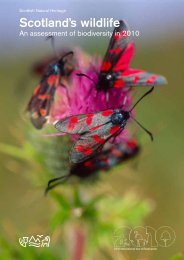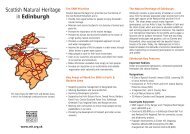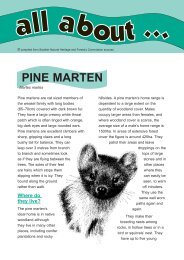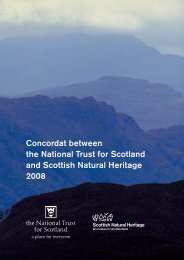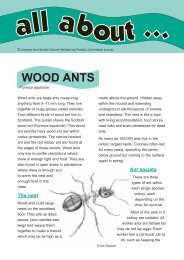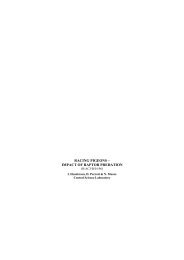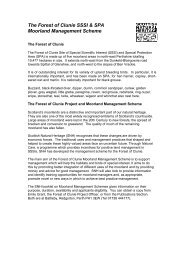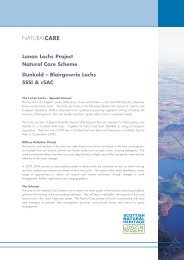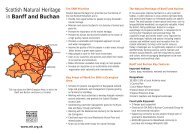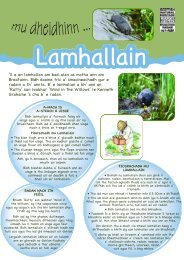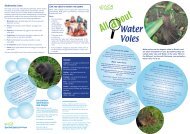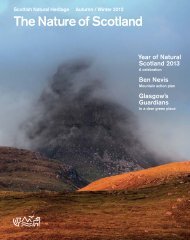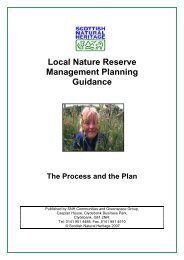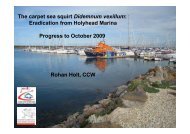Applying wildlife welfare principles to individual animals
Applying wildlife welfare principles to individual animals
Applying wildlife welfare principles to individual animals
Create successful ePaper yourself
Turn your PDF publications into a flip-book with our unique Google optimized e-Paper software.
COMMISSIONED REPORT<br />
Summary<br />
<strong>Applying</strong> <strong>wildlife</strong> <strong>welfare</strong> <strong>principles</strong> <strong>to</strong> <strong>individual</strong> <strong>animals</strong><br />
Commissioned Report No.: 630<br />
Project no: 13899<br />
Contrac<strong>to</strong>r: Ohl, F., Putman, R. J., Department of Animals in Science and Society,<br />
Utrecht University<br />
Year of publication: 2013<br />
Background<br />
Welfare of <strong>wildlife</strong> has increasingly become a focal point for SNH in recent years. SNH has<br />
developed a draft position statement on <strong>wildlife</strong> <strong>welfare</strong> which sets out essential <strong>principles</strong> on<br />
<strong>welfare</strong> which the organisation will adopt. This report is presented as part of an extension of<br />
such <strong>principles</strong> in seeking <strong>to</strong> establish how SNH’s <strong>welfare</strong> <strong>principles</strong> should be applied at the<br />
level of <strong>individual</strong> <strong>wildlife</strong> <strong>animals</strong>.<br />
Main findings<br />
At any one point in time an <strong>individual</strong> animal’s <strong>welfare</strong> status lies on the continuum<br />
between negative/bad <strong>welfare</strong> and positive/good <strong>welfare</strong>.<br />
Welfare must be considered as more than simply the avoidance of negative states: any<br />
<strong>welfare</strong> concept should extend <strong>to</strong> embrace promotion of positive status.<br />
Short periods of ‘negative <strong>welfare</strong>’ may be inevitable if these are unders<strong>to</strong>od as triggers <strong>to</strong><br />
release appropriate behavioural or physiological responses <strong>to</strong> adapt <strong>to</strong> these challenges.<br />
A <strong>welfare</strong> issue arises only when an animal or group of <strong>animals</strong> have insufficient<br />
opportunity (freedom) <strong>to</strong> respond appropriately <strong>to</strong> a potential <strong>welfare</strong> ‘challenge’ by<br />
adaptation and changes in its own behaviour.<br />
A positive (<strong>individual</strong>) <strong>welfare</strong> state would be safeguarded when the animal has freedom<br />
<strong>to</strong> adequately react <strong>to</strong> the demands of the prevailing environmental circumstances.<br />
Assessment of <strong>welfare</strong> should thus focus not so much on the challenges which any<br />
animal may face at a given moment but on whether or not the animal has freedom and<br />
capacity <strong>to</strong> react appropriately (i.e. adaptively).<br />
Because of differences in behavioural reper<strong>to</strong>ire and coping strategies, <strong>welfare</strong> status<br />
may vary considerably between <strong>individual</strong>s even when exposed <strong>to</strong> the same<br />
environmental conditions.<br />
Any animal’s status must be assessed against its own <strong>individual</strong> adaptive capacity and<br />
can only really be considered in relation <strong>to</strong> how that status is perceived and judged by<br />
that animal itself.<br />
For further information on this project contact:<br />
Jessica Findlay, Scottish Natural Heritage, Cameron House, Oban, Argyll, PA34 4AE.<br />
Tel: 0300 244 9360 or jessica.findlay@snh.gov.uk<br />
For further information on the SNH Research & Technical Support Programme contact:<br />
Knowledge & Information Unit, Scottish Natural Heritage, Great Glen House, Inverness, IV3 8NW.<br />
Tel: 01463 725000 or research@snh.gov.uk<br />
i



